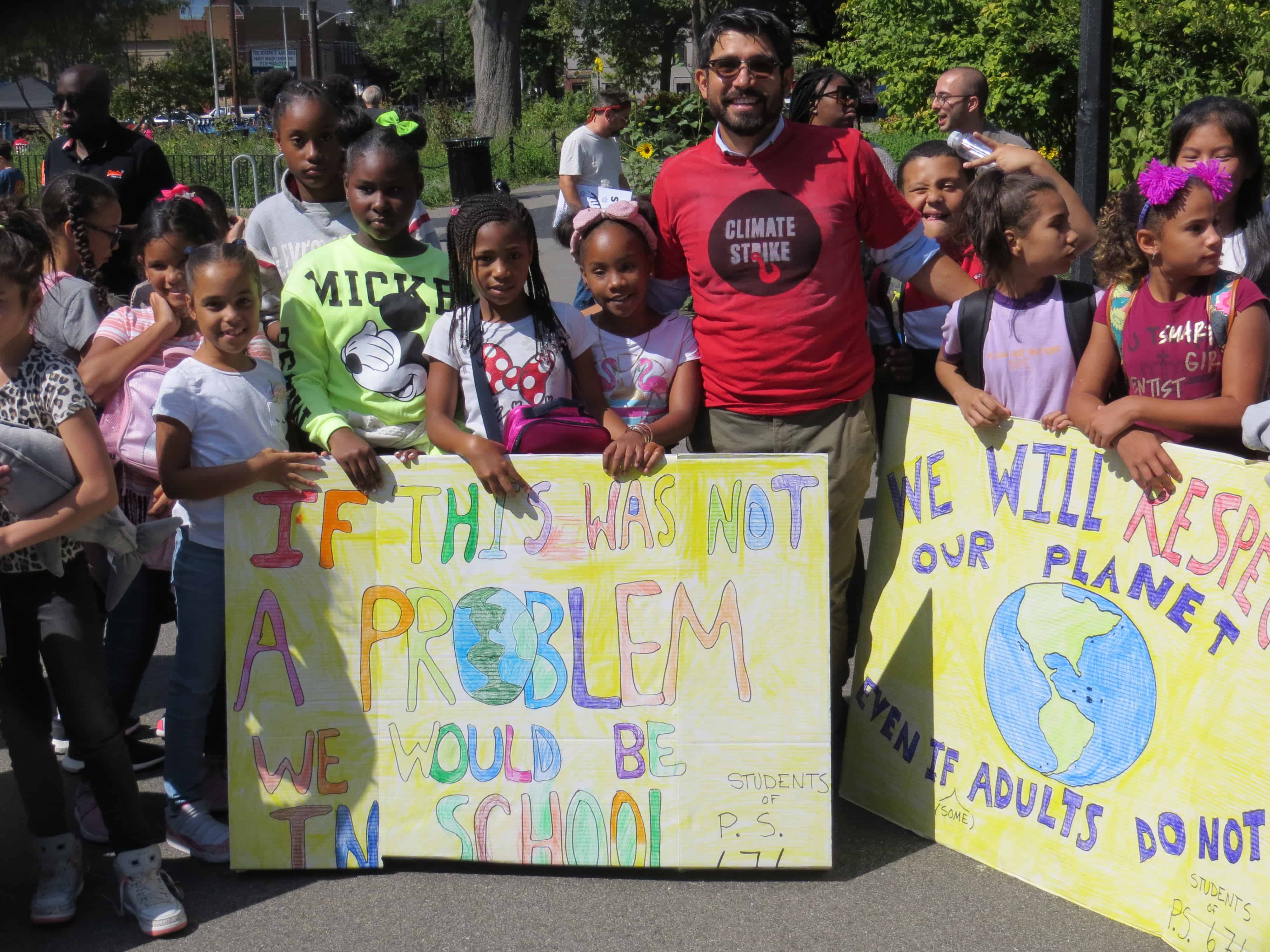Inspired by the Swedish teenage activist Greta Thunberg, students around the world left school on September 20 to protest for dramatic political action to address the climate crisis – including elementary school kids from all the Red Hook schools and the Brooklyn New School.
The PS 676 fourth and fifth grades attended a local rally at Coffey Park, and there were also eight fourth- and fifth-graders who marched over the Brooklyn Bridge with Borough President Eric Adams. Climate change awareness directly links to ecological aspects of the school’s new maritime theme.
Fourth- and fifth-grade English Language Arts (ELA) teacher Jennifer Thomas said that the students started doing research on Monday, and then on Tuesday they started work on their signs for the climate strike.
“They colored during breakfast in the cafeteria and a few of them wanted to stay during recess and work on the signs,” Thomas said. “That says a lot when kids want to work during their breakfast time and during recess to make signs for this.”
Some of the signs said: “You are wasting too much electricity,” “Save the planet,” “Act now or swim later,” “We will respect the planet even if adults do not,” “If this was not a problem we would be in school,” and “We should not have to rally for this cause.”
Students explored many different climate change-related issues leading up to Friday’s strike. Assistant Speaker of the New York State Assembly Felix Ortiz came to Thomas’s class on Wednesday to speak with the students and lead group activities.
“Since we are a maritime STEAM school, most of the research has been centered around how climate change impacts the ocean,” Thomas said. “Today they held signs they made, marched, listened to activists speak, met Carlos Menchaca and danced. They were really excited about being activists in Red Hook.”
Tim Heintz, who teaches third- to fifth-graders, led the eight PS 676 students on the march over the Brooklyn Bridge. The kids who came with Heintz were ones he had a close rapport with and ones he knew would take the march over the Brooklyn Bridge seriously.
“We had a fabulous time,” Heintz said. “We were definitely one of the younger schools there. A lot of high schools were there. Brooklyn Tech came out in great numbers, but everybody was welcoming. They were encouraging us and happy to see us.”
“They supported us in our chant, we supported them, and it was a wonderful opportunity,” Heintz continued. “Everybody out there was working together towards the same goal, and it was evident.”
The PS 676 kids took the train to Borough Hall, walked over the bridge, and then walked to Pier 11 at Wall Street to take the NYC Ferry back to Red Hook. They enjoyed seeing the ship their school partners with, the Mary Whalen, on the way back, and sitting on the top deck of the ferry after all their walking.
In addition to learning about climate change, students gained a better understanding of how to bring attention to their concerns in their community.
 “They can use their voice and be activists in elementary school and make a difference in their community and their world,” Thomas said. “It was important for Principal Figueroa to validate that for the students and for the students to know she supported their activism.”
“They can use their voice and be activists in elementary school and make a difference in their community and their world,” Thomas said. “It was important for Principal Figueroa to validate that for the students and for the students to know she supported their activism.”
Assistant Speaker Ortiz and the parents of the PS 676 students were supportive of the kids participating.
“These are all adult issues that they are preparing for,” Heintz said. “To start thinking about these things now is only going to help their future.”
PS 15 also had some of their students attend the strike. According to school faculty, the fifth grade went to the strike since they are the oldest in the school.
The fifth grade from PS 15 was the earliest to get to Coffey Park, arriving at 11:15 am with homemade signs. Their chants included: “In with the Green New Deal, out with the green house gases!” and “Do we want construction? No more destruction!”
Jeylani Thomas, a fifth-grader at PS 15, spoke on stage with her classmates. “I want to change adults’ minds about climate change,” she said. “I think we need to stop burning fossil fuels.”
A PS 15 fifth-grade homeroom teacher reflected on the significance of the strike for the kids.
“This is their future in Red Hook, especially since they’re vulnerable [by virtue of Red Hook’s geography],” Mr. Coleman said. “I think it’s important for them to know about climate change and the way it’ll affect their future.”









